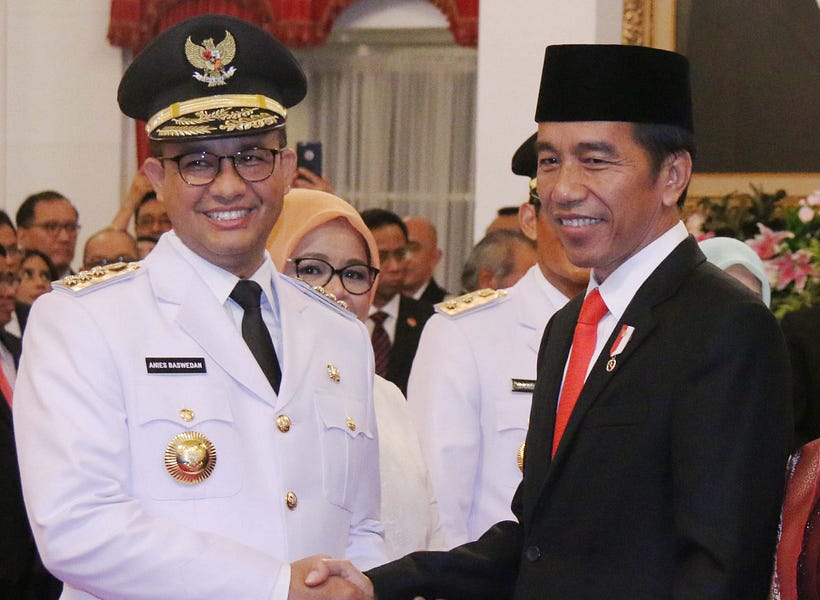With Indonesian President Joko Widowo’s political party floundering over naming his successor, outgoing Jakarta Governor Anies Baswedan (above, left, with Jokowi), considered by many to be the president’s antithesis because of his antipathy to development and his ties to Islamists, is building strength with announcement of three parties to back him in the 2024 general election.
While two of the three are opposition parties, including the Democratic Party headed by former President Susilo Bambang Yudhoyono, and the Islamist Prosperous Justice Party (PKS), the third is the Nasdem Party, a component party of Widodo’s own government.
With Anies shaping up as one of the country’s strongest presidential candidates, the country’s biggest party, the Indonesian Justice Party of Struggle, or PDI-P, headed by matriarch and kingmaker Megawati Sukarnoputri, is flailing and losing traction over her insistence in naming her daughter, Puan Maharani, as a successor, which many regard as suicidal because her electability is so low. The party has yet to determine its candidate, which has led to speculation that it is at sea with its rank-and-file members – and Jokowi – wanting Central Java Governor Ganjar Pranowo, consistently the most popular figure in the country although he is beginning to lose ground to Anies. However, rumors say that the party is currently selecting five names of its members, and it is likely that they will officially announce the presidential candidate in June.
It is clear that the Anies’ coalition has a different mission from the current government’s. He has been widely perceived as a thorn in Jokowi’s side since the president fired him as education minister in the early years of Jokowi’s first term. In 2017, Anies defeated Jokowi’s ally Basuki Tjahaja Purnama in the heated Jakarta gubernatorial election and allied himself with the government’s opposition parties, particularly the Islamists, who ran an ugly campaign accusing Ahok, a Chinese Christian, of blasphemy and ended up with Ahok in jail. While in office, Anies reportedly scrapped Ahok’s programs and was often not in line with central government policies.
The declaration of support for Anies by Nasdem in October 2022 is reported to have particularly hurt Jokowi’s long-term political interests by joining into a coalition with opposition parties that often criticize government policies. With the relationship between Jokowi and Nasdem leader and media conglomerate magnate Surya Paloh deteriorating, the issue of a cabinet reshuffle ousting ministers from Nasdem is getting stronger. The party currently has three members in the Jokowi cabinet, including Communication and IT Minister Johnny G. Plate, Agriculture Minister Syahrul Yasin Limpo, and Environment and Forestry Minister Siti Nurbaya. Jokowi has thrown a number of reshuffle signals on the last few occasions.
The certainty of Anies’ nomination is expected to encourage other political parties to immediately announce their presidential and vice presidential candidates. The Gerindra and PKB coalition has long since declared support for former general and defense minister Prabowo. The three-party coalition consisting of the Golkar Party, the National Mandate Party (PAN), and the United Development Party (PPP) has yet to determine a presidential candidate.
Anies Opportunities and Challenges
Supported by Surya and businessman Jusuf Kalla, Anies is predicted to have a growing chance of winning the fight, which is sending shudders through the international business community and diplomatic circles. The former university lecturer is cultivating opportunities by becoming the non-Jokowi, an alternative for voters who are disappointed with the government’s performance, as well as accommodating Prabowo supporters who didn’t like his choice to become Jokowi’s defense minister. Anies thus has the potential to take over the backing of other Islamist groups that supported Prabowo in the 2014 and 2019 elections. Other potential candidates such as Ganjar, Puan, and Prabowo don’t have Anies’s strong branding.
Anies’ candidacy is also considered to have the right momentum. Jokowi will end his term in the midst of a major global inflation, which is affecting the welfare of common Indonesian people. That is a potent weapon for Anies and another opposition figures. Megawati is complicating the picture with her refusal to act on a viable presidential candidate.
The early declaration strategy was an attempt to create a “snowball effect” for Anies and the votes obtained by the coalition member parties. A longer socialization period for presidential candidates has the potential to increase Anies’ electability considering that his electoral level is still far behind Ganjar and is in tight competition with Prabowo. This also opens up opportunities for the coalition to consolidate its loyal voter base, as well as gain undecided voters and swing voters.
However, the brand as Jokowi’s antithesis is also a challenge for Anies. Political observer from Indonesia’s Al Azhar University Ujang Komarudin predicts that Anies will face fierce resistance from Jokowi’s supporters. Anies’ track record in terms of failures and weaknesses such as “the zero rupiah” housing program that was not realized and Anies’ closeness to hardline Islamic groups will continue to be highlighted.
Most recently, a Sandiaga Uno, a member of the Gerindra Party and Minister of Tourism, suddenly brought up a political agreement that he, Anies, and Prabowo Subianto signed shortly before their candidacy in the 2017 Jakarta gubernatorial election. Anies’ promise not to advance in the presidential election as long as Prabowo advances in the contest. However, Anies’ supporters avoided that the promise was made in the context of the 2019 general election. Golkar Party deputy chairman Erwin Aksa revealed that Anies owed Rp50 billion to Sandiaga as campaign funds during the gubernatorial election.
Another challenge is the potential for the coalition to disband because there is no agreement regarding the vice presidential candidate. The Democratic Party has insisted on proposing their general chairman, Agus Harimurti Yudhoyono (AHY) as a vice presidential candidate. Meanwhile, PKS wants the former governor of West Java Ahmad Heryawan to accompany Anies. Both names have a low level of electability.
Even though Anies has pocketed support from the party, observers argue that the coalition map is still very likely to change before the registration of the presidential and vice-presidential candidate pairs at the General Elections Commission (KPU) which opens next October, including the possibility of the coalition disbanding.


















![Ep265: [Lean Series] 5 Ways You’re F*cking Up Your Fat Loss Ep265: [Lean Series] 5 Ways You’re F*cking Up Your Fat Loss](https://carrotsncake.com/wp-content/uploads/2025/01/IMG_3025-768x1024-1.jpg)
.png)

Discussion about this post